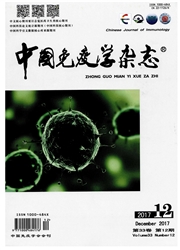

 中文摘要:
中文摘要:
目的:分析人早孕蜕膜及蜕膜基质细胞趋化因子受体CCR2及其配体CCL2在人早孕蜕膜组织及蜕膜基质细胞的表达和分泌,以探讨CCR2/CCL2在母-胎界面的生物学作用。方法:收集早孕期蜕膜组织,分离蜕膜基质细胞,分别用半定量RT-PCR、免疫化学方法分析正常人早孕蜕膜组织和培养的人蜕膜基质细胞CCR2/CCL2表达;并且用流式细胞术和ELISA法分别检测蜕膜基质细胞表面CCR2的表达和培养的蜕膜基质细胞上清中CCL2的分泌。结果:人早孕蜕膜组织和蜕膜基质细胞均高水平转录和翻译CCR2/CCL2,培养的基质细胞能分泌大量的CCL2,其分泌量呈时间依赖性。结论:早孕蜕膜高表达和分泌CCR2/CCL2可能参与早孕期母一胎免疫调节。
 英文摘要:
英文摘要:
Objective:To investigate expression of the ehemokine CCL2 and its receptor CCR2 in human decidua and decidual stromal cells (DSC) of the first trimester gestation. Methods:The deciduae were from women who had undergone an artificial abortion at 5-11 weeks of normal gestation. The total RNA was extracted by using the TRIzol reagent,from decidua or the Percoll-gradient-isolated DSC. The expressions of CCR2 and CCL2 in deciduas and DSC were determined by way of semi-quantitative reverse transcriptase polymerase chain reaction (RTPCR), immtmocytochemistry, immtmohistochemistry, flow eytometry and ELISA, respectively. Results: CCR2 and CCL2 were highly expressed in decidua and DSC. The DSC could secret CCL2 in a time-dependent manner, and the highest concentration was beyond 20 ng/ml. Conclusion: CCR2 and CCL2 have been expressed in decidua and DSC of human first trimester gestation, and may play an important role in the decidual immune cell constitution in human early gestation.
 同期刊论文项目
同期刊论文项目
 同项目期刊论文
同项目期刊论文
 Prevention of embryo loss in non-obese diabetic mice using adoptive ITGA2(+)ISG20(+) natural killer-
Prevention of embryo loss in non-obese diabetic mice using adoptive ITGA2(+)ISG20(+) natural killer- Combination of estrogen and dioxin is involved in the pathogenesis of endometriosis by promoting che
Combination of estrogen and dioxin is involved in the pathogenesis of endometriosis by promoting che Regulation of C-C motif chemokine ligand 2 and its receptor in human decidual stromal cells by pregn
Regulation of C-C motif chemokine ligand 2 and its receptor in human decidual stromal cells by pregn Cyclosporin A improves pregnancy outcome by promoting functions of trophoblasts and inducing materna
Cyclosporin A improves pregnancy outcome by promoting functions of trophoblasts and inducing materna Cyclosporine A induces titin expression via MAPK/ERK signalling and improves proliferative and invas
Cyclosporine A induces titin expression via MAPK/ERK signalling and improves proliferative and invas Chemokine CXCL12 promotes the cross-talk between trophoblasts and decidual stromal cells in human fi
Chemokine CXCL12 promotes the cross-talk between trophoblasts and decidual stromal cells in human fi Cyclosporin A promotes growth and invasiveness in vitro of human first-trimester trophoblast cells v
Cyclosporin A promotes growth and invasiveness in vitro of human first-trimester trophoblast cells v Cyclosporin A improves murine pregnancy outcome in abortion-prone matings: involvement of CD80/86 an
Cyclosporin A improves murine pregnancy outcome in abortion-prone matings: involvement of CD80/86 an The DSC-expressed KAI1/CD82 controls the invasiveness of trophoblast cells via integrinβ1/MAPK/Erk1/
The DSC-expressed KAI1/CD82 controls the invasiveness of trophoblast cells via integrinβ1/MAPK/Erk1/ Thymic stromal lymphopoietin from trophoblasts induces dendritic cell-mediated regulatory TH2 bias i
Thymic stromal lymphopoietin from trophoblasts induces dendritic cell-mediated regulatory TH2 bias i CXCL12 controls over-invasion of trophoblasts via upregulating CD82 expression in DSCs at maternal-f
CXCL12 controls over-invasion of trophoblasts via upregulating CD82 expression in DSCs at maternal-f E-cadherin, as a negative regulator of invasive behavior of human trophoblast cells, is down-regulat
E-cadherin, as a negative regulator of invasive behavior of human trophoblast cells, is down-regulat The decidual gamma-delta T cells up-regulate the biological functions of trophoblasts via IL-10 secr
The decidual gamma-delta T cells up-regulate the biological functions of trophoblasts via IL-10 secr Characterization of natural killer cells in nonobese diabetic/severely compromised immunodeficient m
Characterization of natural killer cells in nonobese diabetic/severely compromised immunodeficient m FTY720-induced conversion of conventional Foxp3-CD4+ T cells to Foxp3+ regulatory T cells in NOD mic
FTY720-induced conversion of conventional Foxp3-CD4+ T cells to Foxp3+ regulatory T cells in NOD mic The costimulatory signal upregulation is associated with Th1 bias at the maternal-fetal interface in
The costimulatory signal upregulation is associated with Th1 bias at the maternal-fetal interface in The CD4+CD25bright regulatory T cells and CTLA-4 expression in peripheral and decidual lymphocytes a
The CD4+CD25bright regulatory T cells and CTLA-4 expression in peripheral and decidual lymphocytes a TSLP-induced placental DC activation and IL-10+ NK cell expansion: Comparative study based on BALB/c
TSLP-induced placental DC activation and IL-10+ NK cell expansion: Comparative study based on BALB/c Proteomic analysis of proteins differentially expressed in uterine lymphocytes obtained from wild-ty
Proteomic analysis of proteins differentially expressed in uterine lymphocytes obtained from wild-ty 期刊信息
期刊信息
